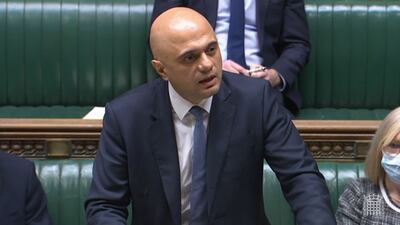Britain’s health secretary says the wave of Omicron infections in England has passed its peak.
Sajid Javid said he was “cautiously optimistic” that the Plan B measures will be “substantially reduced” next week in light of data showing falling case numbers and hospital admissions.
Government ministers are expected to meet over the coming days to review the situation before a final decision is announced before Plan B expires on January 26.
Addressing MPs in the House of Commons, Mr Javid pointed to Covid figures that suggest the wave of Omicron has already peaked.
“Eight weeks ago, when this House last met for Health and Social Care Questions, the world had not even heard of the Omicron variant, yet since then we have seen a third of the UK’s total number of Covid-19 cases recorded,” he told MPs in the House of Commons.
“The action that this government has taken in response to Omicron and the collective efforts of the British people have seen us become the most boosted country in Europe, the most tested country in Europe, and the most antivirals per head in Europe.
“That is why we are the most open country in Europe.
“I have always said that these restrictions should not stay in place a day longer than absolutely necessary.
“Due to these pharmaceutical defences and the likelihood that we have already reached the peak of the case numbers of hospitalisations, I am cautiously optimistic that we will be able to substantially reduce restrictions next week.”
Mr Javid’s comments come days after the chairman of the ruling Conservative Party said he was hopeful Plan B could be lifted next Wednesday. Oliver Dowden said the data “seems to be heading in the right direction, particularly, crucially, in relation to hospitalisations, which seem to be plateauing”.
What are the Plan B measures?
— Working from home for employees who can.
— Mandatory face masks in most public indoor venues including retail outlets, cinemas, salons and places of worship. Hospitality venues including pubs, hotels and restaurants are exempt.
— Covid certificates showing double vaccination or a recent negative test result compulsory to gain entry to nightclubs and other crowded settings.
‘No premature promising on end of restrictions’
Dr David Nabarro, the World Health Organisation’s special envoy on Covid-19, warned against leaders getting people’s hopes up by promising that restrictions would be lifted on a specific date.
He said that because of the changing nature of the virus, it would be advisable for decision-makers to refrain from offering even a loose timeline.
“I’m a public health person … I would not be making promises some time in the future because, once you make a promise, it’s super hard then to change what you’re going to do — you feel you’re kind of doing a U-turn,” Dr Nabarro told BBC Breakfast.
“This virus is constantly evolving and it’s super hard to predict where it will be — we can say where we hope we’re going to go, we can say where we’d like to go, we can say what we think we need to do to get there — but making promises that we’ll do something on a particular date, I think, is unwise.”
Dr Nabarro reiterated his view that the situation in the UK “gives us grounds for hope” but continued to urge caution.
“The goal that we’re all aiming for is a situation where this virus is present, but life is organised so that it is not disrupted,” he said.
“We also need to be humble — this virus is continuing to evolve and we’re never quite sure that we know exactly where it’s going to go next.”
Prof Andrew Hayward, a member of the Scientific Advisory Group for Emergencies, said scientists hope the “direction of travel” for Covid-19 variants is that they become less severe.
However, the University College London expert said there remains the possibility of new strains that could spread faster than Omicron.
He said that any new variant would need to “out-compete Omicron” through increased transmissibility or escape from immunity, and not through changes in severity.
“It doesn’t do the virus any good to become increasingly severe,” he told Times Radio.
“In fact, it looks like the Omicron variant, by becoming more transmissible, that it’s also become less severe, and we would hope that’s the general direction of travel.”
He said that in future not everyone would need booster vaccines: “I think the people that we might want to think about boosting the most are the same as flu really — people with chronic illness and elderly people — and we’ll probably move into a sort of more regular annual vaccination programme, or it may not even need to be that frequent.
“We need to wait for the evidence on that.”


